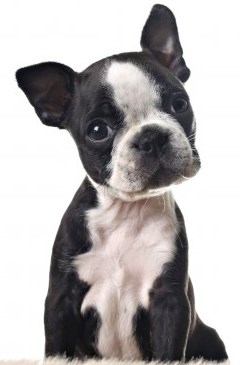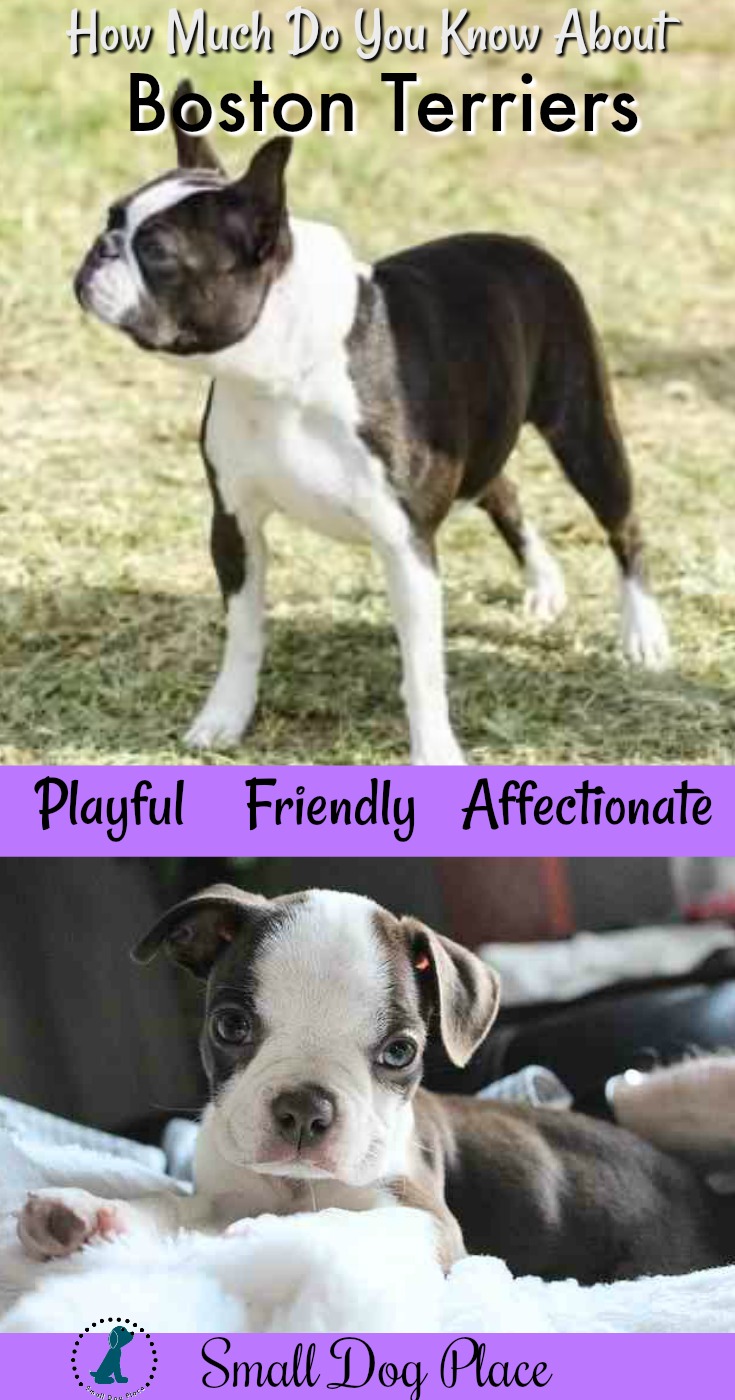- Small Dog Place Home
- A-Z Breeds A to M
- Boston Terrier
How Much Do You Know About The Energetic, Entertaining Boston Terrier Dog Breed
by Janice Jones |Last Updated 02-04-2022
Is the Boston Terrier the right dog for you? Well, if you’re looking for a lively, energetic and highly entertaining bundle of energy, then this may be the perfect small dog breed for you.
They are highly intelligent and very motivated to learn therefore training is easy. Even though they have energy to spare, an extensive exercise program is not always necessary. Still like any dog breed, exercise is important and should not be ignored.
Bostons have that special ability to entertain anyone for hours and are sometimes thought of as having a clown-like personality.
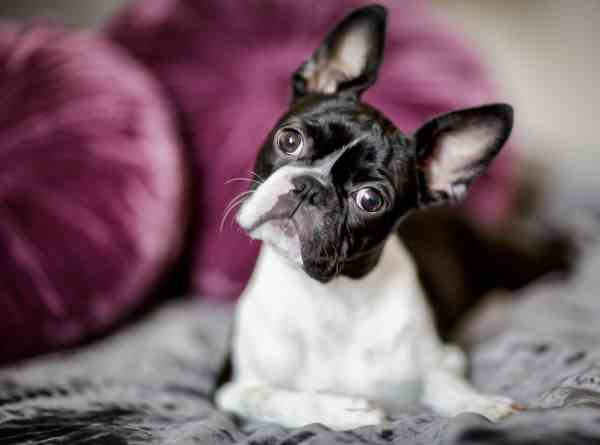
Beyond amusing, these little dogs that fall well within the definition of a small dog have great manners and style, so much so that they have received the nickname of 'The American Gentleman.'
Due to the Boston’s short, flat, deep muzzle, they tend to inhale an excess amount of air while they are eating. In return, some can be extremely gassy at times. This is typical of many bully breeds.
They also are quite noisy in the sense that they have quite the sound dictionary because of their muzzle, which might include: snorting, grunting, and snoring. But they are not considered to be a yappy breed and when they bark, there is usually a very good reason for doing so.
However, if those simple flaws don’t bother you, then this could be the match made in heaven. Most Boston owners find them charming and would never have another dog breed.
Other Topics on This Page...
Quick Facts
Other names used: Boston Bull, and American Gentleman; because of their “perfect” coat, which is said to look like they are wearing a tuxedo
Affiliation: AKC, non sporting group
Size:
Height: 15 - 17 in (23- 38 cm)
Weight: 6 – 25 lbs (3-11 kg)
Coat Type: smooth and fine with average amount of shedding
Colors: brindle, black, or seal (appears black with reddish tint when observed in the sunlight)
Country of Origin: United States of America
Activity Level: no excessive exercise requirements, routine walks
Life Expectancy: 15+ years
Good with Children: excellent with children and families
Good with other Pets: yes
History
The Boston Terrier was originated in “ Beantown” or our very own Boston, Massachusetts, hence the name.
Back in the 1800’s when dog fights were very popular, they were bred to fight.
A cross between the English Bulldog and the now extinct White English Terrier. Bred to be vicious, some Boston’s weighed over 45 pounds and were called Ole Boston Bulldogge.
Over the years, they were shrunk down to the adorable size that you see now.
When the Boston was first bred and discovered, the markings and color was neither prominent nor important at all.
Over the years the markings and color helped get the breed's nickname of “American Gentleman” because of the resemblance to wearing a tuxedo.
The Boston Terrier was one of the very first breeds developed in America and the first bred recognized by the American Kennel Club (AKC).
Personality
| Traits | Rating |
|---|---|
| Playfulness | |
| Affection Level | |
| Friendliness Towards Strangers | |
| Good with Children | |
| Good with Other Dogs | |
| Good for First Time Owners | |
| Exercise Needed | |
| Ease of Training | |
| Watch Dog Ability | |
| Grooming Requirements | |
| Shedding | |
| Cold Tolerant | |
| Heat Tolerant |
Dog Breed Ratings Got You a Little Confused?
Here's a little help in understanding them
- Playfulness: Most Playful = 5 Least Playful = 1
- Affection: Most Affectionate = 5 Least Affectionate = 1
- Friendliness Towards Strangers: Most Friendly = 5 Least = 1
- Good With Children: Great= 5 Not Good with Children = 1
- Good With Dogs: Great = 5 Not Good Around Dogs = 1
- Good With First Time Owners: Fine=5 Not Appropriate = 1
- Exercise Required: Extensive Daily Exercise = 1 Minimal = 1
- Ease of Training: Very Easy = 5 Difficult = 1
- Watch Dog: Excellent Watch Dog = 5 Minimal = 1
- Grooming: Time Consuming = 5 Minimal = 1
- Shedding: Heavy Shedder = 5 Minimal = 1
- Cold Tolerance: Well Tolerated = 5 Poor Tolerance = 1
- Heat Tolerance: Well Tolerated = 5 Poor Tolerance = 1
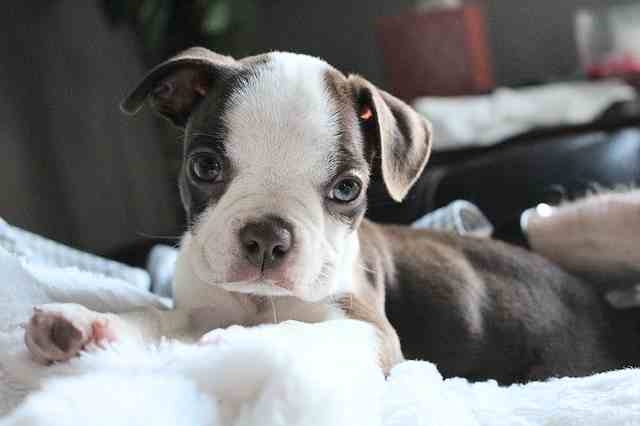
The breed is an extremely outgoing, cheerful, and entertaining dog. Some say that their personality is almost clown-like in the sense that they are always making a fool of themselves.
They are very friendly to other animals, and only bark when they feel is necessary such as if they are being riled up, or someone is at the door because Boston’s love to be watch dogs.
They are extraordinarily sweet natured and loves people, especially children.
They always love to please and be around their owner; however they are also very protective of their owner due to their roots. They are in no means violent whatsoever. Both male and female are gentle and kind.
Once fighting dogs, and then bred down to friendly companions. Due to the sensibility they have about barking, they make great pets for apartment dwellers.
Excess exercise is not required however your Boston will probably run around and wear themselves out if given an open yard or a large space to do so in.
Bostons tend to overwork them and they will run and play until someone stops them which don’t help their respiratory problems.
They will become overheated very quickly, if you do not watch them and stop them when you think that they have had enough. Although they might not want to stop playing, it is up to you to use your best judgment.
With that being said, they do not do well in climates with extreme heat or cold.
They are not outdoor dogs at all and should not be left outside unsupervised even during the day with mild temperatures.
Many people assume that dogs will be fine left outside for a couple of hours, but not the Boston.
Grooming
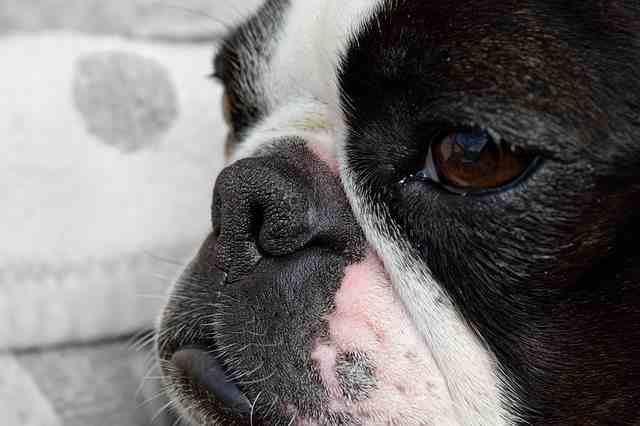
Sporting a lovely tuxedo look, smooth coat and beautiful colors, you wouldn't think that this breed needed any grooming. The truth is that they are a "wash and wear" sort of breed but that doesn't mean that they don't need some grooming.
Shedding is the average but a brushing to distribute oils and remove dead hair will make the coat shine and look its best. Bathing is necessary when dirty or when the Boston has decided to investigate something messy, but frequently bathing is not required.
Other than that, their nails need to be clipped or filed and the teeth brushed. A periodical inspection of the ears is important and any excessive debris removed. Finally, a daily eye check is very important in this breed and prompt veterinary attention if something looks unusual. Using saline drops or artificial tears regularly can help the Boston's eyes stay clean and dust free.
More information on grooming a short haired dog.
Health Concerns of the Breed
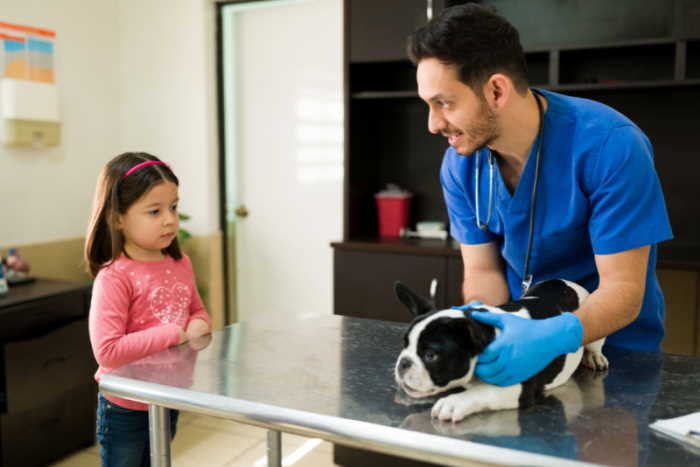
This is a relatively healthy breed but like all small dogs are prone to certain conditions. Do not get alarmed by the list below. Chances are good your Boston won't have any of these issues, but it is good to know just in case.
The main concerns relate to respiratory issues since they are considered a brachycephalic breed, eye problems, luxating patella, deafness, and heart murmurs. These dogs are also prone to .
Since Boston Terriers have very large prominent eyes, they are prone to injury or simply daily dust in the environment irritating the cornea. Eye problems can also be inherited and some of these issues can be identified by a board certified veterinary ophthalmologist.
Deafness has also been identified in the breed and responsible breeders will screen for these issues in any dogs they plan to breed as well as puppies.
As mentioned above, any flat-faced dog breeds (called brachycephalic) can have breathing difficulties. These can be mild such as occasional snorting or snoring, to life threatening. It's best to protect the Boston from excessive heat and humidity and plan exercise routines during cooler times of the day.
Luxating Patella
Respiratory Difficulties/Brachycephalic Syndrome
Hip Dysplasia
Exercise Needs
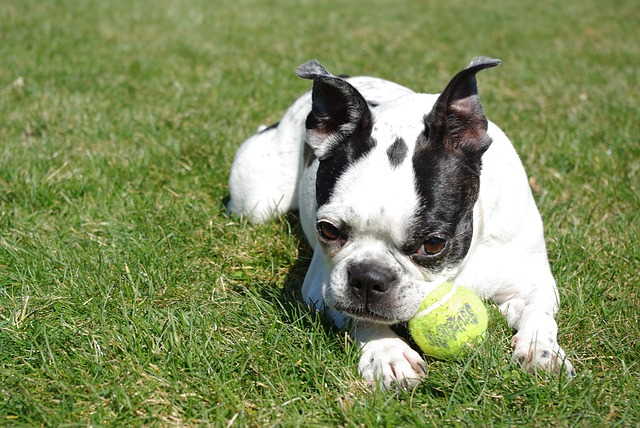
Most Boston Terriers do great with a walk or two each day or a romp in the yard. Some Boston Terrier owners prefer to participate in a canine sport such as agility, flyball, or rally. These are excellent ways to keep your Boston in great shape. But if organized sports are not your thing, playing fetch will keep your dog happy for as long as you can keep up.
With this said, Bostons are very flexible and will do very well within the confines of the owner's ability to provide exercise.
Training Needs
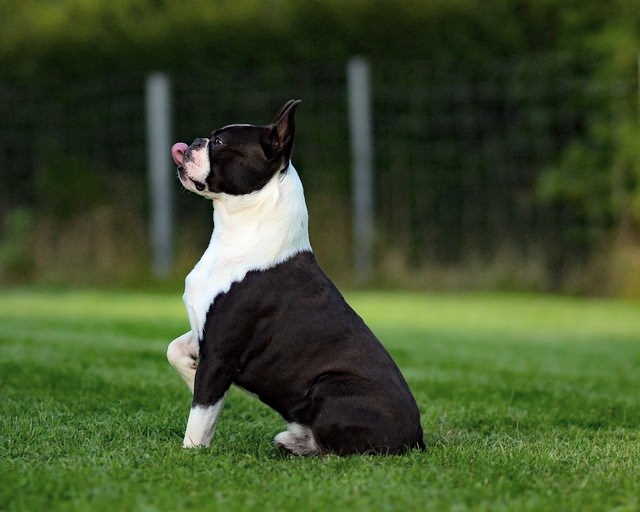
As with any dog breed, training starting in puppyhood is very important. Socialization begins at birth and should be part of any breeding program, but once the puppy goes to the new home, socialization should be part of the daily routine.
Most Bostons are food-motivated meaning that you can use tasty treats to encourage good behavior. No harsh methods should ever be allowed. Boston Terriers are sensitive any anything negative will simply scare them and not motivate appropriate behavior. Praise, love and treats will all help create a strong bond between you and your dog.
Best Owners for Bostons
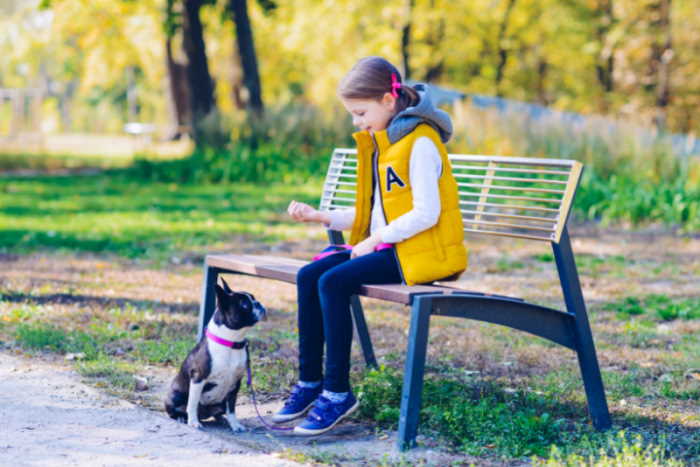
This breed does very well with people of all ages including families with children, couples, singles and seniors. They are equally at home in a rural setting as they are in the city. After all, they were originally developed in the city of Boston, MA.
They make an excellent choice for a first
These dogs love children and do very well with older respectful kids. No dog should be subjected to very young children who do not know how to play and respect the dog's needs.
The best owner for this breed is one that will provide the love, attention, and care that these dogs deserve.
Nutritional Needs
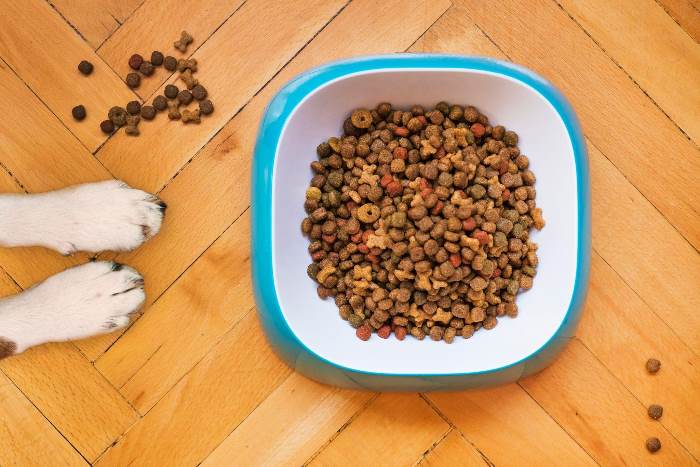
Like any dog breed, the Boston Terrier should be fed a high quality age appropriate diet. Check with your veterinarian or dog breeder to see what to feed. Feed the best food that your budget will allow as it will pay dividends in good health and vigor. Treats are important for training, but don't overdo especially with treats that have little nutritional value.
Many human foods make excellent treats but not are foods are appropriate for dogs. Learn what human foods may be toxic to dogs and what fruits and vegetables make excellent choices for dogs.
Pros and Cons of This Breed
Pros
- Friendly with children and other animals
- Good watch dog
- Entertaining and friendly
- Requires minimal grooming
- Can live in apartments
- Highly intelligent and easy to train
- Minimal barking
Cons
- Does poorly in excessive heat or cold
- Can be overprotective of owners
- Can be prone to gas
- Potential breathing problems
- They can tend to chew a lot, but with the many chew toys provided, it shouldn’t be a problem
- Tendency to be over-hyper at times
Did You Know?
Helen Keller had a Boston terrier named Phiz, given to her by some classmates at Radcliffe College?
Boston Terriers are one of the few truly American Breeds?
The State Dog of Massachusetts is the Boston Terrier
Resources
Parent Club
Breed Club: Boston terrier Club of America, Inc.
Need More Info on the Boston Terrier?
If you are thinking about choosing a Boston Terrier to be your new best friend, why not pick a good read to bone up on the breed's specific training and care requirements. Here are a couple of highly rated books on the breed, available on Amazon.
About Janice (author and voice behind this site)
Having lived with dogs and cats most of her life, Janice served as a veterinary technician for ten years in Maryland and twelve years as a Shih Tzu dog breeder in Ohio.
Her education includes undergraduate degrees in Psychology with a minor in biology, Early Childhood Education, and Nursing, and a master's in Mental Health Counseling.
She is a lifelong learner, a dog lover, and passionate about the welfare of animals. Her favorite breed for over 50 years has been the Shih Tzu, but she has also lived with poodles, Maltese, Yorkshire Terriers, beagles, English bulldogs, carin terriers, and a Cocker Spaniel.
When not writing, reading, and researching dog-related topics, she likes to spend time with her eight Shih Tzu dogs, husband, and family, as well as knitting and crocheting. She is also the voice behind Miracle Shih Tzu and Smart-Knit-Crocheting
Does This Article Deserve Your Thumbs Up?
We always appreciate your support and encouragement. Your thumbs up means so much to us. Please like this article.
If you find this page or any page on Small Dog Place Helpful, or useful in anyway, I'd love it if you would click the small heart found on the bottom right of each page.
You can also share or bookmark this page -- just click on the:

Free Monthly Newsletter
Sign Up for Our Free Newsletter and get our Free Gift to You.
my E-book, The Top 10 Mistakes People Make When Choosing a Dog (and how to avoid them)
